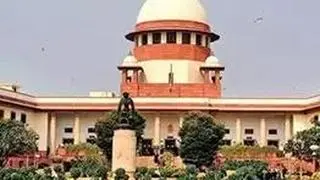The Supreme Court verdict on the land acquisition for the Tata Nano factory is a strong reminder for every government that misuse of law does not pay.
Responding to an appeal challenging the legality of the 997-acre acquisition by the then CPI(M)-led Left Front government, the apex court on Wednesday held that the “entire acquisition process was illegal”.
The judges were unanimous that the enquiry process that led to the notification for acquisition was not properly held, and ordered the return of the acquired (and developed) land to the original owners within 12 weeks.
The nearly 83 per cent of who had lost their land and had taken compensation (willing farmers) need not return the money. They will also get the land back. The unwilling farmers would get compensation for the loss of farmland during the intermittent period.
According to Arunabha Ghosh, a senior advocate of the Calcutta High Court, after Wednesday’s judgment, the Tata Motor’s plea against reacquisition of the Singur land by the Mamata Banerjee government in 2011 will be “infructuous”.
Tata Motors relocated the project, barely months before commissioning, to Gujarat in October 2008.
After assuming power in 2011, the Trinamool Congress government took possession of the disputed land through a newly-drafted Singur Land Rehabilitation and Development Act.
According to industry captains, the Singur verdict will not impact the potential of the State in attracting investment. This is, of course, the official statement. Privately, a prominent industrialist pointed out that the Tata Nano episode already served a major blow to the investment potential and there is nothing more to lose.
The relocation took place at a time when Bengal was in the spotlight of investors in India and abroad. It also pressed the pause button on Bengal’s dream to emerge as an auto hub.
Looking from this perspective, Wdnesday’s verdict doesn’t necessarily mean the Left Front government was wrong in throwing its weight behind the Tata investment. While debating if the State was wrong in describing the project as a ‘public purpose’, the judges too differed in opinion.
Arrogance killed But there is little doubt that in their enthusiasm the Buddhadeb Bhattacharjee government misused the law and ended up blowing a golden opportunity to revive the industrial prospects of the State.
First, the project could have easily come up at a government land near Kharagpur, a little over 100 km from Kolkata.
The Tatas were reportedly happy with Kharagpur as it is well connected by rail and national highway and is merely 150 km from Tatanagar. But just when everything looks settled, the boat was rocked. According to an official who saw the developments from close quarters, someone proposed building the auto factory closer to Kolkata, on the lines of those in Chennai. The CPI(M) leadership pitched for it, and Tatas responded.
Land was chosen arbitrarily. Local CPI(M) swung into action, to force the decision on the people. That the people were against it was clear from the 2006 Assembly elections results when Trinamool was routed across the State except in Singur. They wrested that seat from the Left. But the Left took it as a prestige issue and stepped up gear.
In its verdict, the apex court pointed out that in the hurry to acquire the land, the legal provisions were ignored.
What if the State had followed the rule book? Reliance Industries wanted to set up a mammoth SEZ at Raigarh in Maharashtra. People voted against it. The project was suspended in September 2008, a month ahead of the Tata Nano relocation from Singur.
Political impact According to Ghosh, the verdict is debatable on some technical grounds. But he has little doubt that it had practically ended the decade-long dispute.
This brightens the image of Mamata Banerjee who came to power riding on the anti-land acquisition wave and serves a major blow to CPI(M)’s electoral prospects in the State in the years to come.
CPI(M)’s vote and seat share is declining at an alarming rate since the 2009 general election. Efforts to revive the industrialisation agenda in the 2016 Assembly election failed miserably. What’s more, post-election they are losing elected representatives to Trinamool.
In her press conference, Chief Minister Mamata Banerjee recounted the land acquisition as a “suicidal decision” of the Left.
“It is a day to rejoice for every farmer in the country. The struggle of Singur established their rights over land,” she said.







Comments
Comments have to be in English, and in full sentences. They cannot be abusive or personal. Please abide by our community guidelines for posting your comments.
We have migrated to a new commenting platform. If you are already a registered user of TheHindu Businessline and logged in, you may continue to engage with our articles. If you do not have an account please register and login to post comments. Users can access their older comments by logging into their accounts on Vuukle.